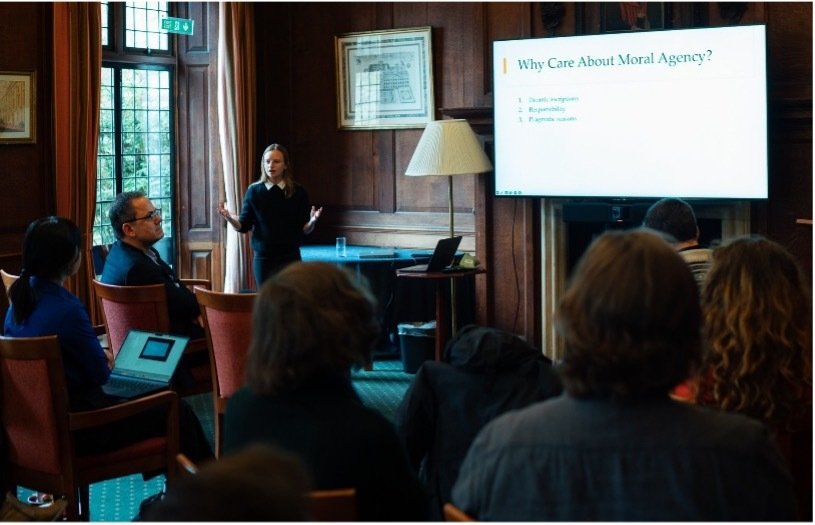Exploring New Frontiers: the Inaugural Philosophy, AI, and Society (PAIS) Doctoral Colloquium
The inaugural Philosophy, AI, and Society (PAIS) Doctoral Colloquium took place on March 6th and 7th, 2023, in Corpus Chrisi College at University of Oxford. The colloquium brought together six doctoral students working on topics that reflect the wide range of questions that the burgeoning field of normative philosophy of computing aims to address. The normative philosophy of computing aims to foster cutting edge and empirically informed philosophical research in the analytic tradition. (One might notice a tongue-in-cheek connection between the normative philosophy of computing and its acronym, “NPC”; an allusion to the “non-playing character” role that analytic philosophy has often played in debates over the development and use of computing technology in society, as compared with other fields.) This makes the range of questions that NPC addresses wider than the range addressed under the recent heading of “AI Ethics.”This year, we heard from Austen McDougal (Stanford) on the connection between memory and considerateness, and ways in which social media augmented our memorial awareness of others, undermining our capacity to express considerateness in ways that used to matter, and still ought to.Cameron McCulloch (Michigan) raised a question that intersects several areas of lively philosophical interest—including ethics of statistical inference, doxastic wronging, attention and salience—presenting a set of obstacles to coming up with principled constraints on the sorts of inferences that corporate and state agents may make about individuals, without also curtailing robust cognitive liberty for individual human subjects.Ruby Hornsby (Leeds) presented an analysis of human-robot relationships in terms of “imaginary friendship,” but signaling some considerably more worrisome consequences of these relationships than the thoroughly imaginary friendships many recall from childhood.A. G. Holdier (Arkansas) presented a refinement of our understanding of context collapse, extending the taxonomy beyond the two-fold analysis in terms of authorial and adversarial collapse, to a fourfold analysis that distinguishes collapse caused by social agents and algorithmic agents.
Felicity (Yuhan) Fu (Sheffield) used an analysis of large language models that generate moral judgments to put pressure on an appealing theory of the connection between human emotion and moral principles. Fu’s presentation especially highlights the aim of NPC to use the analysis of novel computing technology to illuminate our understanding of traditional questions of normative philosophical interest.The colloquium closed with Jen Semler (Oxford) disambiguating many (far more than many might have initially thought!) types of artificial moral agency. Semler’s talk made salient how without empirical engagement that runs deeper than (even very good) op-eds about AI, one is apt to miss subtle joints of conceptual and moral interest.The doctoral students were well-outnumbered by a large audience of faculty and postdoctoral scholars from Oxford and other UK universities. Seth Lazar (ANU) and John Tasioulas (Oxford) spearheaded the organization of the colloquium and commented on doctoral student presentations along with Dr. Kate Vredenburgh (LSE), Dr. Liam Bright (LSE), Dr. Max Khan Hayward (Sheffield), Dr. Milo Phillips-Brown (Oxford), and Dr. John Zerilli (Edinburgh).
Many other faculty and postdoctoral scholars joined the colloquium and participated in the interstitial events—round table discussions, faculty mentoring sessions, and meals. A core aim of the colloquium is not just the refinement of doctoral student research, but the building of community at all levels of the profession working in NPC. To that end, the inaugural PAIS doctoral colloquium was an auspicious and electrifying success.




